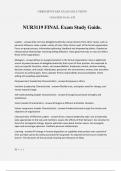©BRIGHTSTARS EXAM SOLUTIONS
11/16/2024 10:16 AM
NUR3119 FINAL Exam Study Guide.
Leaders - answer✔do not have delegated authority: power derives from other means, such as
personal influence. Have a wider variety of roles. May not be a part of the formal organization.
Focus on group process, information gathering, feedback and empowering others. Emphasize
interpersonal relationships. Directing willing followers. Have goals that may or may not reflect
those of the organization.
Managers - answer✔Have an assigned position in the formal organization. Have a legitimate
source of power because of delegated authority that is part of their position. Are expected to
carry out specific functions, duties, and responsibilities. Emphasize control, decision making,
decision analysis, and results. Manipulate, personnel, the environment, money, time and other
resources to achieve goals. Have a greater formal responsibility and accountability. Direct
willing and unwilling subordinates.
Empowerment (Leadership Characteristic) - answer✔empowers others
Intuition (Leadership Characteristic) - answer✔builds trust, anticipates need for change, and
moves toward change
Self-understanding (Leader Characteristic) - answer✔recognizes personal strengths and
weaknesses
Vision (Leader Characteristic) - answer✔imagine a different and better situation
Values congruence (Leader Characteristic) - answer✔understand and accept the mission and
objectives of organization
Characteristics of Effective Leaders - answer✔Use a natural leadership style. Use a leadership
style appropriate to the task and members. Assess the effects of their behavior. Are sensitive to
forces for and against change. Express optimistic view about human nature. Are energetic,
open and encourage openness. Facilitate personal relationships.
Learning - answer✔A change in human disposition or capability that persists over a period of
time and that cannot be solely accounted for by growth. An experience that occurs inside the
learner. The discovery of the personal meaning and relevance of ideas.
1|Page
, ©BRIGHTSTARS EXAM SOLUTIONS
11/16/2024 10:16 AM
Teaching - answer✔Holds learner's interest. Involves the learner in the learning process. Fosters
a positive self-concept in the learner. Sets realistic goals. Is directed at helping the learner meet
objectives.
Behaviorism (Thorndike, Pavlov, Skinner) - answer✔The environment influences behavior and
how a person controls it. The more quickly reinforcement follows a response, the more
effective is the reinforcement. CLASSICAL CONDITIONING, OPERANT CONDITIONING,
REINFORCEMENT, EXTINCTION.
Social Learning Theory (Bandura) - answer✔Agrees that the environment influences overt
behavior, but also the characteristics of the person and the person's behavior. OBSERVATIONAL
LEARNING, IMITATION, MODELING
Cognitivism (Piaget) - answer✔Learning is the development of understandings and appreciation
that help the individual function in a larger context. Learning is based on a change of perception
that is, learning is a largely mental, intellectual or thinking process.
Cognitive Learning Process - answer✔Acquiring, Processing and Using information.
Humanism (Maslow, Rogers) - answer✔Focuses on both cognitive and affective areas of the
learning. Learning is self-motivated, self-initiated, and self evaluated.
Bloom's Taxonomy - answer✔Cognitive Domain: Intellectual skills, Affective Domain: Emotions,
Psychomotor Domain: Motor Skills
Nurse as a Life Long Learner (Standard 8 Education) - answer✔The registered nurse: reflects
current nursing practice, ongoing educational activities, commitment to lifelong learning, seeks
experiences that reflect current practice, acquires knowledge and skills, seeks formal and
independent learning, contributes to a work environment conducive to the education,
maintains professional records.
Socialization - answer✔Associated with specialized KNOWLEDGE, SKILLS, ATTITUDES, VALUES,
NORMS, required to perform the professional role.
Leadership Styles - answer✔Charismatic, Authoritarian, Democratic/Participative, Laissez-
Fair/Non-Directional, Situational, Transactional, Transformational, Caring
Evidence-Base Practice - answer✔brings together, THEORY, CLINICAL DECISION-MAKING, and
JUDGEMENT, and KNOWLEDGE of the research process; incorporating them into the evaluation
of research and scientific evidence.
2|Page




